情态动词can(could),may(might)的用法
(完整版)情态动词must、can、could、may、might精解
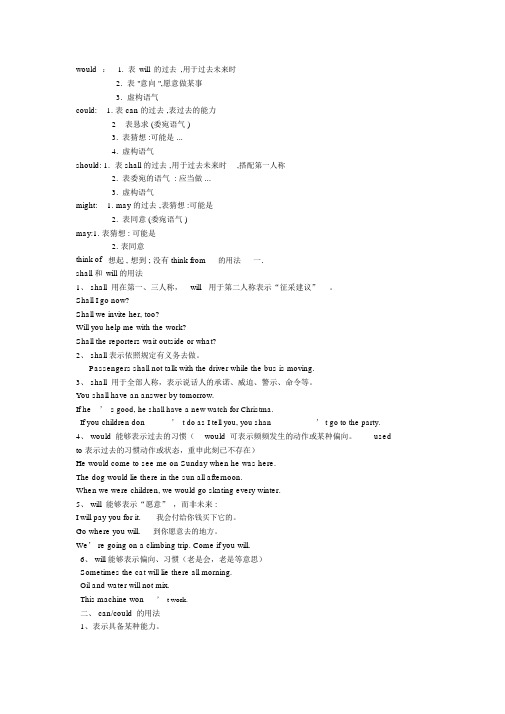
would: 1.表will的过去,用于过去未来时2.表 "意向 ",愿意做某事3.虚构语气could: 1. 表 can 的过去 ,表过去的能力2表恳求 (委宛语气 )3.表猜想 :可能是 ...4.虚构语气should: 1. 表 shall 的过去 ,用于过去未来时,搭配第一人称2.表委宛的语气 : 应当做 ...3.虚构语气might: 1. may 的过去 ,表猜想 :可能是2.表同意 (委宛语气 )may:1. 表猜想 : 可能是think of shall 和2. 表同意想起 , 想到 ; 没有 think fromwill 的用法的用法一.1、 shall 用在第一、三人称,will用于第二人称表示“征采建议”。
Shall I go now?Shall we invite her, too?Will you help me with the work?Shall the reporters wait outside or what?2、 shall 表示依照规定有义务去做。
Passengers shall not talk with the driver while the bus is moving.3、 shall 用于全部人称,表示说话人的承诺、威迫、警示、命令等。
You shall have an answer by tomorrow.If he’ s good, he shall have a new watch for Christma.If you children don’ t do as I tell you, you shan’ t go to the party. 4、 would 能够表示过去的习惯(would 可表示频频发生的动作或某种偏向。
used to 表示过去的习惯动作或状态,重申此刻已不存在)He would come to see me on Sunday when he was here.The dog would lie there in the sun all afternoon.When we were children, we would go skating every winter.5、 will 能够表示“愿意” ,而非未来 :I will pay you for it.我会付给你钱买下它的。
can could may might would的区别
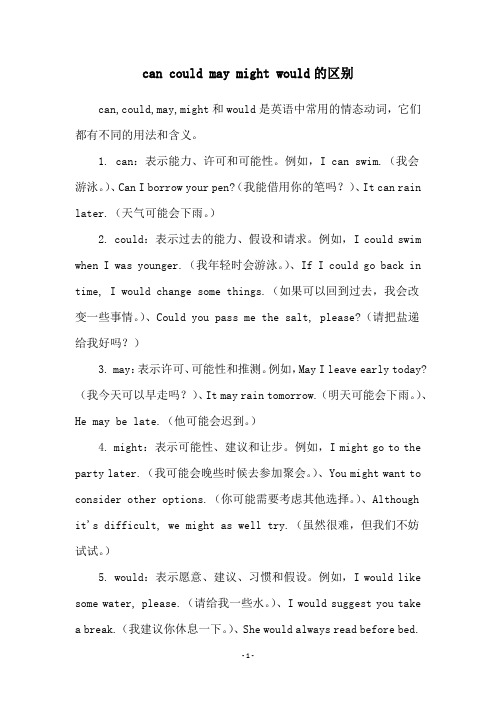
can could may might would的区别can,could,may,might和would是英语中常用的情态动词,它们都有不同的用法和含义。
1. can:表示能力、许可和可能性。
例如,I can swim.(我会游泳。
)、Can I borrow your pen?(我能借用你的笔吗?)、It can rain later.(天气可能会下雨。
)2. could:表示过去的能力、假设和请求。
例如,I could swim when I was younger.(我年轻时会游泳。
)、If I could go back in time, I would change some things.(如果可以回到过去,我会改变一些事情。
)、Could you pass me the salt, please?(请把盐递给我好吗?)3. may:表示许可、可能性和推测。
例如,May I leave early today?(我今天可以早走吗?)、It may rain tomorrow.(明天可能会下雨。
)、He may be late.(他可能会迟到。
)4. might:表示可能性、建议和让步。
例如,I might go to the party later.(我可能会晚些时候去参加聚会。
)、You might want to consider other options.(你可能需要考虑其他选择。
)、Although it's difficult, we might as well try.(虽然很难,但我们不妨试试。
)5. would:表示愿意、建议、习惯和假设。
例如,I would like some water, please.(请给我一些水。
)、I would suggest you take a break.(我建议你休息一下。
)、She would always read before bed.(她习惯在睡前阅读。
情态动词mustcancouldmaymight表推测用法
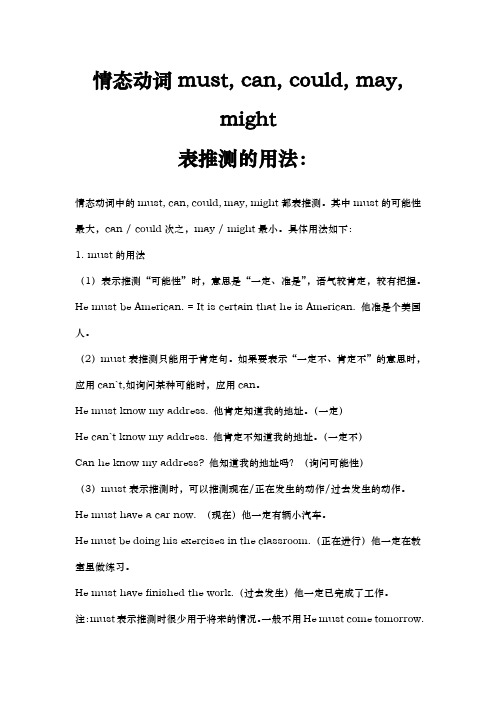
情态动词must, can, could, may,might表推测的用法:情态动词中的must, can, could, may, might都表推测。
其中must的可能性最大,can / could次之,may / might最小。
具体用法如下:1. must的用法(1)表示推测“可能性”时,意思是“一定、准是”,语气较肯定,较有把握。
He must be American. = It is certain that he is American. 他准是个美国人。
(2)must表推测只能用于肯定句。
如果要表示“一定不、肯定不”的意思时,应用can`t,如询问某种可能时,应用can。
He must know my address. 他肯定知道我的地址。
(一定)He can`t know my address. 他肯定不知道我的地址。
(一定不)Can he know my address? 他知道我的地址吗?(询问可能性)(3)must表示推测时,可以推测现在/正在发生的动作/过去发生的动作。
He must have a car now. (现在)他一定有辆小汽车。
He must be doing his exercises in the classroom.(正在进行)他一定在教室里做练习。
He must have finished the work.(过去发生)他一定已完成了工作。
注:must表示推测时很少用于将来的情况。
一般不用He must come tomorrow.可用It`s certain / I`m sure that he will come tomorrow.(4)在反意疑问句中,当附属部分含有表示推测意义的must时,疑问部分的助动词应与must后面的动词在非推测情况下的用法保持一致。
He must be a worker, isn`t he? (现在)他准时个工人,是吗?It must have rained last night, didn`t it? (过去)昨晚一定下雨了,是不是?You must have learned English for many years, haven`t you? (完成时)你一定学了好多年英语,是吗?2. can / could的用法(1)can表示推测“可能性”时,往往用于否定句或疑问句。
常用的情态动词八个用法

常用的情态动词八个用法情态动词是英语中非常重要的一类动词,它们可以用来表达说话者的态度、意愿、推测、建议等。
在英语中,常用的情态动词有八个,分别是can、could、may、might、shall、should、will和would。
下面我们来看看这八个情态动词的用法。
1. Can和CouldCan和could都表示能力或可能性。
Can表示现在的能力或可能性,而could则表示过去的能力或可能性。
例如:- I can speak English.(我会说英语。
)- When I was young, I could run very fast.(我小时候跑得很快。
)2. May和MightMay和might都表示可能性,但may的可能性更大一些。
例如:- It may rain tomorrow.(明天可能会下雨。
)- He might be late.(他可能会迟到。
)3. Shall和ShouldShall和should都表示建议或义务。
Shall用于第一人称,should 用于第二人称和第三人称。
例如:- Shall we go to the cinema tonight?(今晚我们去看电影好吗?)- You should study harder.(你应该更加努力学习。
)4. Will和WouldWill和would都表示意愿或推测。
Will表示现在或将来的意愿或推测,而would则表示过去或虚拟的意愿或推测。
例如:- I will help you with your homework.(我会帮你做作业。
)- If I had more time, I would travel around the world.(如果我有更多时间,我会周游世界。
)情态动词在英语中是非常重要的一类动词,掌握它们的用法对于学好英语非常有帮助。
情态动词can,could,may和might的用法
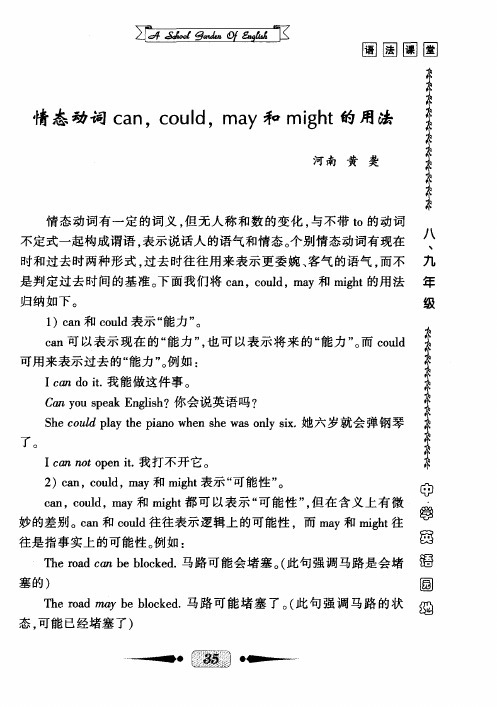
笠
H yb eof e 他 可 能在 办公 室 。 ema ei t fc. nh i
级
在 表示 “ 可 能” , 常用 c n 而不 用 m yn t 如 : 不 时 也 a’ t a o。例 IS e 'o kn w, ecnt ei sh o. 经 十点 了 ,他不 可 能 t no lc o h a 'b n c o1 已 ’t c 在 学校 。
C nyusekE g s?你会 说英 语 吗? a o pa nlh i
S e o l lytepa ow e h a nys . 六岁 就会 弹 钢琴 h udpa i h ns ew sol i 她 c h n x
了。
I a, o p ni 我 打不开 它 。 /n t e . c/ o t 2 a , o l, y和 mi t 示 “ )cn cud ma g 表 h 可能 性 ” 。
更有 礼 貌 。其 中 c n较 多地 用 于 疑 问句 和 否定 句 中 ,而 c ud在 表 示 a ol “ 能” 可 的推测 时 , 口气 上 比 Cl婉 转 。 如 : 在 a l 例
一
Tl ’ n t n . oeC/ i b ?那 个不 是 我 的 , 可 能是 谁 的 I t o mie Wh s Ott e as 它
0
学 圜
回 固
T era a ebok d 马 路可 能 会堵 塞 。 此 句强 调 马路 是 会 堵 晤 h dc nb l e . o c (
T era a ebokd 马 路 可 能 堵 塞 了 。此 句 强 调 马路 的 状 h odm yb lce. (
态 . 能 已经堵 塞 了 ) 可
I d nt k o o ' n w.Bu e c u d ' b n ca s o m.T e ca so m s t h o l nt e i l s r o h l s r o i
情态动词表示“推测”的用法

情态动词表示“推测”的用法英语中,情态动词can / could, may / might, must / can, would / should 等都可以表示“推测”。
具体用法如下:1. can 和couldcan 表示推测时,可能性比较大,用于疑问句或否定句中,不用于肯定句中,意思是“不可能”。
表示一种有把握的推测。
表示否定时,can’t语气最强。
如:It can’t be Mr Li. He has gone to Nanjing already.They can’t know the answer. Let me explain it to them.That can’t be her husband. She is still single.could 表示推测时,可以用于否定句,也可以用在后面跟不定式一般式的肯定句。
表示可能性不大的推测。
意思相当于may / might。
如:Anything could happen if you do not obey the rule.It could be true. But I still doubt it.2. may和mightmay / might 表示一种“可能性很小”的推测。
多用在肯定句或否定句中,might 用在疑问句中表示“可能”,语气最弱。
如:My English teacher may be correcting our exercises in her office.My sister may not be in her room at this moment.The scientists might be discussing the pollution problem.3. must 和can在表示推测的情态动词中,must 的把握最大,意思为“一定,肯定”。
表示对一般情况的推测。
如:Your sister must be a doctor, isn’t she?The boys must be playing football on the playground, aren’t they?Li Ping must be punished by his father.(以上几句要注意其反意疑问句的构成)can的推测用法:在肯定句中can 可以表示客观的(理论的)可能性,并不涉及具体某事是否会发生,此用法常常可以说明人或事物的特征。
情态动词的用法
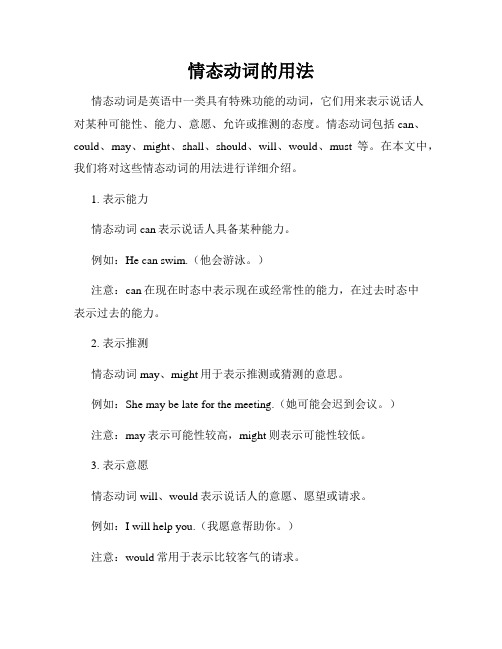
情态动词的用法情态动词是英语中一类具有特殊功能的动词,它们用来表示说话人对某种可能性、能力、意愿、允许或推测的态度。
情态动词包括can、could、may、might、shall、should、will、would、must等。
在本文中,我们将对这些情态动词的用法进行详细介绍。
1. 表示能力情态动词can表示说话人具备某种能力。
例如:He can swim.(他会游泳。
)注意:can在现在时态中表示现在或经常性的能力,在过去时态中表示过去的能力。
2. 表示推测情态动词may、might用于表示推测或猜测的意思。
例如:She may be late for the meeting.(她可能会迟到会议。
)注意:may表示可能性较高,might则表示可能性较低。
3. 表示意愿情态动词will、would表示说话人的意愿、愿望或请求。
例如:I will help you.(我愿意帮助你。
)注意:would常用于表示比较客气的请求。
4. 表示推测的过去情态动词must常用于表示对过去情况的推测或肯定。
例如:He must have missed the bus.(他肯定错过了公交车。
)注意:must用于表示对过去情况的肯定,而might用于表示对过去情况的推测。
5. 表示义务或必要性情态动词must表示对义务、必要性或确定性的肯定。
例如:You must finish your homework.(你必须完成作业。
)6. 表示建议或应该情态动词should表示建议或应该。
例如:You should go to bed early.(你应该早点睡觉。
)注意:should还可以表示对过去情况的推测,例如:He should have arrived by now.(他现在应该已经到达了。
)7. 表示允许或许可情态动词can与may可以用于表示许可或允许。
例如:Can I borrow your pen?(我可以借你的钢笔吗?)8. 表示可能性情态动词could用于表示可能性。
can could may might的区别与用法

can could may might的区别与用法近年来,许多学习者都遇到了can、could、may、might等英语中常用的助动词的困惑。
特别是这几个助动词有着很细微的区别,用错了就会大大影响语言表达和意思的表达,很容易就会让人误解。
因此,要想运用英语使用正确,了解这几个助动词的不同之处是很有必要的。
首先,我们来看“can”。
它是一个常用的情态动词,表示能力、许可或允许的意思。
例如:He can speak English.他会说英语。
我们可以用它来表示能力,也可以用它来询问答复,比如:Can you help me?你能帮助我吗?其次,是“could”。
它也是一个情态动词,表示能力或许可,但它与can有着非常重要的区别:它能够表达过去的能力或许可,而can则表示现在。
例如:He could speak English last year.去年他会说英语。
第三,我们来看“may”。
它也是一个情态动词,表示可能性,它的意思是“可能会……”或“可能不会……”。
例如:He may be here in a few minutes.他可能几分钟内就会到这里。
最后,我们来看“might”。
它也是一个情态动词,与May有着很大的相似之处,可以用来表示可能性,但与May有着微妙的区别:它可以表示比May更小的可能性。
例如:He might be here in a few minutes.他可能会在几分钟内到这里。
综上所述,可以看出Can、Could、May、Might在英语中起着非常重要的作用,用来表达能力、许可、可能性等等。
它们的区别也非常的细微,要想正确运用它们,练习是很有必要的,只有通过多多练习,才能掌握它们的正确用法。
此外,学习英语时要注意音标,以加深理解和拼写,Can [kn]、Could [kd]、May [me]、Might [mat],要正确读出它们的发音,从而更好的学习使用它们。
以上就是Can Could May Might的区别与用法的简单介绍,希望能给大家带来帮助,让我们更好的掌握它们的正确用法,合理地运用它们表达自己的口语和书面表达能力。
- 1、下载文档前请自行甄别文档内容的完整性,平台不提供额外的编辑、内容补充、找答案等附加服务。
- 2、"仅部分预览"的文档,不可在线预览部分如存在完整性等问题,可反馈申请退款(可完整预览的文档不适用该条件!)。
- 3、如文档侵犯您的权益,请联系客服反馈,我们会尽快为您处理(人工客服工作时间:9:00-18:30)。
情态动词can(could),may(might)的用法(一)can和could的用法1.表示能力或客观可能性,还可以表示请求和允许。
如:Can you finish this work tonight?你今晚能完成这项工作吗?Can you finish the work in such a short time你能在那么短的时间内完成这项工作吗?Man can not live without air.人离了空气不能活。
What can you do?你能干点什么呢?Can you pass me the books?你能给我递一下书吗?Could you help me,please?请问,你能帮助我吗?— Can I go now? — Yes,you can.—我现在可以走了吗?—你可以。
注意:①could也可表示请求,语气委婉,主要用于疑问句,不可用于肯定句,答语应用can(即could不能用于现在时态的简略答语中)。
如:Could I come to see you tomorrow?我明天能来看您吗?Yes,you can. (否定答语可用No,I'm afraid not.)是的,你可以。
(不,恐怕不行。
)②can表示能力时,还可用be able to代替。
如:I'll not be able to come this afternoon.我今下午不能来。
can 和could 只能用于现在式和过去式两种时态,将来时态用be able to 来表示。
He could help us at all.他完全可以帮助我们。
With the teacher's help,I shall be able to speak English correctly.他可能拥有这本书吗?5.can not…too\enough表示"无论怎样……也不过分","越……越好"You cannot be too careful when you drive a car.I cannot thank you enough for your great kindness. 对你的盛情美意我感激不尽。
(二)may和might的用法1.表示许可。
表示请求、允许时,might比may的语气更委婉一些,否定回答时(口语中常用)no,you can't . or,yes,please 用mustn't表示“不可以”、“禁止”、“阻止”之意(具有强烈禁止的意思)如:I‘d like to have a smoke here if I may .如果可以的话我想在这儿抽一支烟。
The librarian told her that she might return the book to the library in three days .图书馆理员告诉她说,她可以在三天后还那本书You may drive the car.你可以开这辆车。
— Might I use your pen? — No,you mustn't.—我可以用你的钢笔吗?—不,绝对不行。
用May I ... 征询对方许可在文体上比较正式,在口气上比较客气。
在日常口语中,用Can I ... 征询对方意见在现代口语中更为常见。
You may take the book home.你可以把书带回家去.May I come in?我可以进来吗?May I use your dictionary?我可以用你的词典吗?You may put on more clothes.你可以多穿点衣服.He said he might lend us some money.他说他可以借给我们一些钱。
may 否定式为may not,缩写形式是mayn't.might 是may 的过去式,有两种用法,一种表示过去式,一种表示虚拟语气,使语气更加委婉,客气或对可能性的怀疑。
He told me he might be here on time.他说他能按时间来。
Might I borrow some money now.我可以借点钱吗?2.用于祈使句中表示祝愿。
如:May you succeed!祝你成功!3.表示推测、可能(疑问句不能用于此意)。
I may be busy from tomorrow on .从明天起我可能会忙起来。
You may catch sight of the sunrise from here when you get up before 5 in the morning .你在早晨五点钟以前起来,或许能从这儿看到日出。
She thought it might be wise to try her luck here .她认为在这儿碰碰运气也不错。
He might be alive.他可能还活着。
4.“may(might) + have + 过去分词”表示对过去发生的行为的推测。
如:He may not have finished the work.他可能没有完成工作。
(三)Can和may的共同特征“情态动词”是用于表示说话人的语气和情态的助动词,常表示命令、请求、拒绝、义务、可能需要等。
can和may都具有情态动词的共同特征:①情态动词不同于实义动词,不可单独作谓语,只有跟实义动词连用才有意义。
如:我们应该说I can play chess.而不能说I can chess.应该说You may go. (你可以走了)而不能说You may .②情态动词没有人称和数的变化。
如:I/We/You/He/She/they can speak English.I/We/You/He/She/they may come .③情态动词后的动词必须用原形。
如:我们应该说He can play chess.而不能说He can plays chess.应该说It may rain. (可能要下雨)而不能说It mays rain.(四)Can和may的相似处1.善于推测。
can,may可用来表示猜测、怀疑或不肯定。
不过此时在运用中要注意,can不能用于肯定句,may不能用于疑问句。
(can不肯,may不疑)如:—Where can our teacher be?(这里不能用may代替)我们的老师可能会在哪儿?She may be in her office. (这里不能用can代替)也许在她的办公室里。
2. 谦虚。
can,may都可表示“准许、请求,许可”,此时两兄弟同义,可以互换使用。
不过在这方面用may比用can好一些,因为在表示“请求”时,may表现的更谦虚,更委婉一些。
如:You can/may go home with your mother now. 现在你可以和妈妈一块回家了。
(五)Can与may的区别虽说两者有相似之处,但他们的个性还是非常鲜明的:1.能力超群,刚性十足的can,在表示能力,意为“能、会”方面,还是有很强的实力的。
如:Can you play the guitar?你会弹吉它吗?Yes,I can. 是,我会/No,I can’t. 不,我不会。
2.感情细腻,亲情十足的may,在表示希望、祈求、祝愿,常译为“祝愿”方面,给人无比的温馨。
如:May you be happy!祝你幸福!May the friendship between us last long. 祝愿我们的友情天长地久。
练习1. The light in the office is still on. Mr. White ____be in.A. mustB. mayC. can2. You_______go and ask Meimei.She________know the answer.A. must;canB. must;mayC. need;canD. can;may3. Look out!The knife is very sharp.You________cut your finger.A. needB. mustC. shouldD. may4. I thought you ____ like something to read. So I have brought you some books.A. oughtB. mightC. couldD. must5. –That man must be Sarah`s husband.--No, he ____ be her husband. She is still single.A. can`tB. mustn`tC. may notD. ought to6. Peter ____ come with us tonight, but he isn`t very sure.A. mustB. mayC. canD. will7. –I saw Mary in the library yesterday.--You her. She is still abroad.A. mustn`t seeB. can`t have seenC. mustn`t have seenD. couldn`t see作业1.______ you paint? No, I _______.2. You ________ go to the cinema this evening.3. Lucy isn't here, she _______ be ill in hospital.4.A: Where is my little cat ?B: _______ it be in your room?A: No. it isn’t there.5.______ you have a good time.6. –Could I borrow your dictionary?--Yes, of course you ____ .7. She doesn`t answer the bell. She ____ be asleep.8. Nobody saw her at the meeting yesterday, she_______ have spoken at the meeting9. –My goodness. I just missed the train.--That`s too bad. I am sure you _____ have caught it, if you had hurried.。
